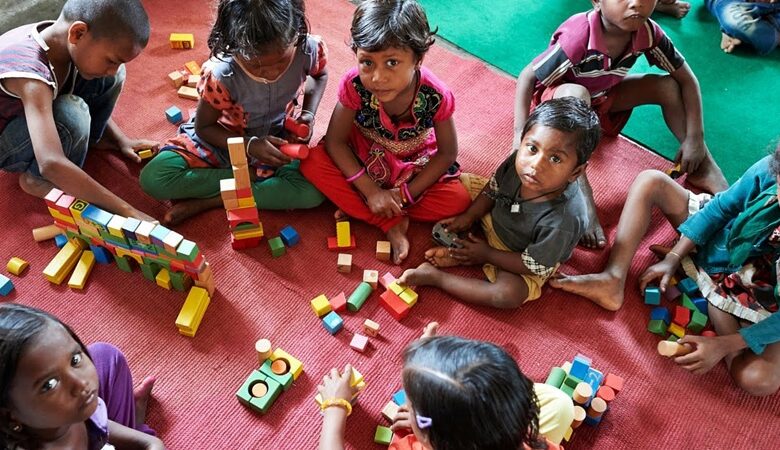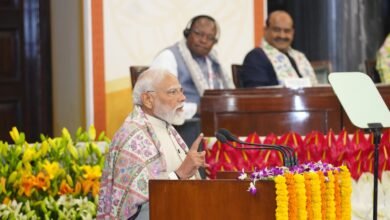
News Mania Desk / Piyal Chatterjee / 25th January 2025
In just a few years, a tiny cluster of cells, attached to the inner lining of the mother’s womb, develops into a conscious, emotional, aware, curious, and functioning person. It will develop the ability for courage, care, compassion, dedication and belief; curiosity, creativity and connection; sense-making, self-control, problem-solving, imagination, integrity and leadership; happiness, sadness, hope and fear; empathy, determination, resourcefulness and resilience.
These are more than mere words. Caregivers of children during their development understand that these grand concepts manifest charmingly in their everyday behaviors, spontaneous thoughts, and in how they think, behave, and connect with others. They can be compassionate and harsh, giving and taking, joyful and sorrowful, confident and uncertain, guiding and trailing, constructing and deconstructing, tumbling and rising, faltering and achieving — all while displaying this remarkable spectrum of abilities.
They acquire much of it independently, driven, as Khalil Gibran famously expressed, by “life’s yearning for itself.” From attaching to the mother’s breast at birth, to wailing for milk. From using her body to crawl and stand, to walking and navigating around obstacles and climbing trees. From comprehending the words whispered to her, to ensuring she is understood by predominantly unaware adults. From creating imaginative tales to understanding the world she lives in and her role within it. The child embarks on an incredible, dynamic, and profoundly personal journey of survival, exploration, and growth in the initial years of her life.
Certainly, we adults desire our children to develop fully, to thrive in their lives, and possibly to assist others in their success. Certain adults may think that kids learn a great deal about growing up independently, so they hardly need to do anything. Some, worried that the children may not fully gain from their insights, might think they should tightly grasp their hand and guide each step — ensuring they develop into precisely who they desire them to be.
For adults, grasping Early Childhood Development (ECD) is an intriguing exploration of themselves.
That journey entails uncovering what children require and do not require from us, identifying the types of environments that enable their growth, and determining how we can facilitate their educational path so they gain the knowledge, attitudes, and abilities necessary for personal happiness and a significant role in society. It informs us of the kind of people we must become for our children to prosper and succeed. ECD is not merely a collection of activities or a handful of programs assembled to occupy children. It involves more than just aiding children in reading and identifying numbers. It’s not just about having them learn songs and tales and perform them for guests. Providing them with just a mid-day meal won’t prevent stunting. It is not only about ensuring they get the medical care that will prevent them from falling ill. It is everything mentioned and even more. A great deal that we overlook at our own risk.
That “much more” beckons to us each day as we observe children mature. Grasping the essence of their environment and forming a significant bond with it, the importance of cooperation among people and between humans and the natural world, a scientific mindset, the capacity to observe, hear, and contemplate, the skill to think both critically and creatively, and the capability to foster physical and emotional strength through an emphasis on well-being: all these are essential for a child to achieve satisfaction in life.
Constructing this cannot be postponed beyond the “Foundational Stage.” Described in India’s 2022 National Curriculum Framework for the Foundational Stage, it pertains to the initial five years of formal schooling for children aged three to eight, during which a child’s cognitive, physical, and socio-emotional development is influenced. By overlooking them at this point, we are greatly failing an entire generation.
Furthermore, there is another aspect that is even more pressing as it is more fundamental. It is understood that children at this point (or any point) will gain little knowledge unless they experience backing from a web of connections that ensure physical and emotional safety and security. They will gain little knowledge unless there are attentive adults nearby who value what the children feel and think and who are ready to incorporate it into the learning experience. They will gain little knowledge unless their learning relates to their experiences and surroundings in significant ways.
We also understand that adults who are not currently experiencing the same themselves — belonging, security, validation, support and safety nets — are unable to offer them to others, including to children. The adults, too, need physical strength, emotional resilience, mental fortitude, artistic expression and technical mastery. They, too, need to learn all this in meaningful ways that connect to their world and experiences. They, too, need to experience relationships. And they need to experience all of it in the communities they belong to – the village, the urban sprawl, the organizations they work in, the support networks, the containers of their existence.
The future of ECD depends on all of this.
Recent developments appear to be promising for the future of ECD in India. The World Health Organization, UNICEF, and the World Bank Group’s promotion of the Nurturing Care Framework in 2019 establishes a crucial foundation with international authority for early childhood interventions to be more comprehensive and attuned to children’s needs than previously. The clear recognition of the Foundational Stage in India’s National Education Policy (NEP) in 2020 marked a notable shift from previous educational policy concerns. It was a significant advancement in recognizing ECD’s proper position. It gave the attendant optimism that resource allocation and the required policy alignment among various public initiatives could become feasible.
Since that time, there have been more urgent demands and certain policy measures in India for broader teacher training and curriculum growth in early childhood education, and this training appears to be benefiting a greater number of front-line workers than before. The improved and expanding access to technology and internet bandwidth has made the task of reaching the extensive Indian front line somewhat more manageable. Regrettably, these green shoots hide many aspects that are alarmingly absent in our perspective of ECD today.
The broad vision of the Foundational Stage in NEP has transformed into a precisely established Foundational Literacy and Numeracy (FLN) concept, to the extent that FLN is frequently used in various contexts as a synonym for early childhood education.
The Nurturing Care Framework is frequently regarded as fulfilled simply due to our existing programs for mid-day meals and vaccinations. Front-line capacity-building persists in utilizing methods that have repeatedly shown to be ineffective over the years, failing to cultivate essential skills or inspire the required motivation and enthusiasm among the participants.
Worryingly, within key groups of policymakers and implementers, the presence of technological solutions has triggered numerous initiatives that largely bypass the uncomfortable, long-term yet fundamentally crucial task of developing skilled teachers. They aim to substitute them with displays, applications, and pre-packaged material, showing a clear disregard for extensive research on early childhood and our innate grasp of children’s requirements.
As we elevate our efforts to protect our future and tackle the challenges presented here, while committing to nurture that sacred flame and congregate around it, we must keep in mind that significant implicit, mostly overlooked beliefs about the organization of the world still prevail. They influence society as a whole and, as a result, may not capture our focus when we consider ECD specifically, yet they impact ECD fundamentally.
A significant portion of public policy has encouraged the belief that the only education deserving of our children’s time and our investment is that which occurs in pre-schools, schools, colleges, and universities. Throughout much of the globe, this has rendered learning focused on information while lacking critical evaluation. It has clustered children into lines and groups in classrooms, leaving them unacquainted with their environment.
It has removed them from effectively using their hands and bodies and has elevated the value of “brain work,” leading to a fabricated crisis of intermittent unemployment. It has severed their ties to their land, their surroundings, their culture, and their communities — substituting them with words printed on paper. It has fostered a profound sense of disempowerment within many of our communities regarding education, creating the notion that they lack the knowledge to be significant participants in their children’s learning.
Although there may be some rationale for this in relation to aerospace engineering or robotic surgery, its application to ECD feels isolating for children and unsettling for society. To ensure a future for ECD, we need to explore the vast knowledge available for children within communities, on the land, through relationships, and in exploration and creativity, including beyond schools and preschools.
The advocates of urbanization have persuaded us to think that the segregation of individuals in cities and towns is unavoidable as we “progress.” Economic and social policies in many nations focused on this dogma have resulted in a significant increase in unsanitary and isolated living conditions in urban areas, while rural communities have suffered greatly from population decline. Mental health issues in city communities have grown concerning, heightened merely by the harsh pressures that come with urban life.
For young children, it has resulted in a scarcity of physical environments for healthy development and play, limited chances for significant community interaction, a social scene tragically lacking in supportive experiences, and alarmingly few avenues for cultivating a resilient character. To ensure a future for ECD, we need to rethink the arrangement of physical communities, their size, how they integrate with the surrounding environment, and the functioning of their cultural, economic, and political connections.
We have likewise been taught that globalization is unavoidable, nearly like a fundamental power. While it does promise economic efficiency, we have, in the course of this, lost a great deal. Diversity is the core of minimizing risks and achieving long-term survival and prosperity, whether concerning an individual, an organization, a community, a nation, or even the evolution of life itself. In just a few decades, dazzled by the allure of economic efficiency, we have sacrificed diversity for significant inequality and the erosion of local skills, trades, crafts, self-sufficiency, agency, and autonomy. Our textbooks, the sole source of information endorsed by our policies, have consistently not sparked an analysis of the fundamental assumptions and their clearly apparent results among our children.
The drive for globalization, detached from genuine experience and indifferent to local demands, has consequently resulted in the disappearance of whole educational frameworks, including, regrettably, those aimed at young children. Consequently, they have promoted and esteemed the formation of a disconnected and estranged elite. The response to that is a troubling degree of anti-intellectualism globally. This, undoubtedly, provides the material for the assembly line that might be deemed the ultimate goal of the globalization ideology originally, yet it also fosters a perilous degree of unpredictability and chaos in society that could ultimately lead to its disintegration. This is not merely a potential. It is occurring right now, globally. For ECD to thrive, we need to recognize the importance of the “local” in our children’s lives, assist them in embracing their individuality, and nurture the self-assurance that enables them to resist the overarching tendencies of today’s world.
Although creating a uniform set for seventeen-year-olds enrolled in a calculus course might be reasonable, it is wholly unsuitable for all five-, six-, or seven-year-olds to be evaluated according to a single set of learning outcomes, or to be confined to a uniform set of learning activities or processes. This kind of standardization, by its very nature, infringes upon the space necessary for development during this phase.
Once introduced, these standards may become increasingly mindless. This was observed when all the tens of thousands of anganwadis (government-operated childcare centers in India), within a specific system, were required to be “teaching” the identical lesson at, for example, 11 AM on Friday, November 20. Carefully designed textbooks were therefore distributed to guarantee the execution of this standardization. Fortunately, the system’s inertia prevented it from truly occurring in many places, but the standardizers’ intention was evident. Even more crucially, substantial chances for the students’ education were certainly missed.
Standardization is enticing since it allows individuals with minimal interaction with children and little grasp of their learning methods to envision and impose their ideas. The implementation does not lead to any learning because that is not the process of learning at this point. However, it is not without danger. It distorts adult behavior, both of educators and guardians, toward their children, substituting empathetic, supportive, and nurturing interactions with meaningless group shouting in structured classrooms and stressed parents insisting on performance in completely irrelevant standardized assessments.
For ECD to have a future, we must firmly reject standardizing impulses and seek to provide our children opportunities to explore their world at their own pace, supported and inspired by affectionate adults.To summarize, education is the primary mechanism that drives long-term change in society. ECD forms the foundations on which all of it is built. For ECD to have a future and for us to have a future, we must hold and cherish ECD in a way that protects and strengthens children today and the society tomorrow.






